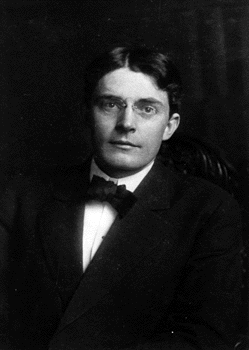John Broadus Watson (1878-1958) was a psychologist and founder of the school of behaviorism that dominated American psychology between around 1920 and 1960. Watson was a "radical environmntalist". He discounted the role of human instinct or genetic make-up in character and behavior. He was hostile to the notion of consciousness, viewing it as an obstacle to scientific psychology.
Watson was heavily influenced Russian psychologist Ivan Pavlov (1849-1936) Nobel Prize-winning (1904) work on conditioned reflexes. Watson's "Psychology as the behaviorist views it," was the manifesto of the American behaviorist movement.
"Psychology as the behaviorist views it is a purely objective experimental branch of natural science. Its theoretical goal is the prediction and control of behavior. Introspection forms no essential part of its methods, nor is the scientific value of its data dependent upon the readiness with which they lend themselves to interpretation in terms of consciousness. The behaviorist, in his efforts to get a unitary scheme of animal response, recognizes no dividing line between man and brute. The behavior of man, with all of its refinement and complexity, forms only a part of the behaviorist's total scheme of investigation."
[Watson, J.B. (1913). Psychology as the behaviorist views it. Psychological Review, 20, 158-177.]
Behaviorists insist that scientific psychology is entirely about relationship between environmental contingencies and behavior, It is assumed that the principles governing behavior of human animals and non-human animals are essentially the same. All behavior is a chain of well-set reflexes.[Watson, J.B. (1913). Psychology as the behaviorist views it. Psychological Review, 20, 158-177.]
Watson's career in acadamia was cut short by a sex scandal; he was caught having an adulterous affair with his research assistant, more commonly today regarded as a perk of the job. From the 1930 Wattson turned to a lucratve career in the adverstising business. His motivation was not purely commercial. Psychology to be in the service of technological utopianism of early 20th century US society,
01 : 02 : 03 : 04 : 05 : 06 : 07 : 08 : 09 : 10

HOME
HedWeb
Future Opioids
BLTC Research
Huxley Hotlinks
cognitive-enhancers.com
The Good Drug Guide
The Hedonistic Imperative
Brave New World by Aldous Huxley
David Pearce
dave@bltc.com
